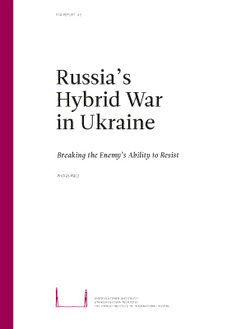
Russia’s Hybrid War in Ukraine: Breaking the Enemy’s Ability to Resist PDF
Preview Russia’s Hybrid War in Ukraine: Breaking the Enemy’s Ability to Resist
FIIA REPORT 43 Russia’s Hybrid War in Ukraine Breaking the Enemy’s Ability to Resist András Rácz FIIA REPORT 43 Russia’s Hybrid War in Ukraine Breaking the Enemy’s Ability to Resist Russia’s Hybrid War in Ukraine Breaking the Enemy’s Ability to Resist András Rácz Senior Research Fellow The Finnish Institute of International Affairs ULKOPOLIITTINEN INSTITUUTTI UTRIKESPOLITISKA INSTITUTET THE FINNISH INSTITUTE OF INTERNATIONAL AFFAIRS WWW.FIIA.FI FIIA rePort 43 Reports can be ordered from the Finnish Institute of International Affairs. +358 9 432 7707 [email protected] All FIIA reports and other publications are also available on our website at www.fiia.fi. Language editing: Lynn Nikkanen Graphic design: Nordenswan & Siirilä Oy / Tuomas Kortteinen Layout: Kaarina Tammisto Printed by Multiprint Oy The Finnish Institute of International Affairs Ulkopoliittinen instituutti PL 400 00161 Helsinki Finland www.fiia.fi [email protected] ISBN 978-951-769-453-7 (web) ISBN 978-951-769-454-4 (print) ISSN 2323-5454 The Finnish Institute of International Affairs is an independent research institute that produces high-level research to support political decision-making and public debate both nationally and internationally. All manuscripts are reviewed by at least two other experts in the field to ensure the high quality of the publications. In addition, publications undergo professional language checking and editing. The responsibility for the views expressed ultimately rests with the authors. About the author András Rácz is Senior Research Fellow at the Finnish Institute of International Affairs (FIIA) in Helsinki. A specialist in Russian and post- Soviet security policy, he defended his PhD in Modern History at the Eötvös Loránd University in Budapest in 2008. Until 2014 he worked at the since disbanded Hungarian Institute of International Affairs. In addition, András has served as Assistant Professor at the Pázmány Péter Catholic University. He was a member of the European Foreign and Security Policy Studies Programme (EFSPS) of the Volkswagen Foundation, and was Visiting Fellow at the Transatlantic Academy of the German Marshall Fund in Washington D.C. in 2011–2012. Table of contents ABout the Author 7 INtroductIoN 11 1 the deveLoPmeNt oF ASymmetrIc wArFAre theory IN the 19th ANd 20th ceNturIeS 19 The importance of geographical conditions in asymmetric warfare 20 The relation between regular and irregular forces 22 Urban warfare, propaganda and terrorism in asymmetric warfare 23 2 the emergeNce oF the hyBrId wAr coNcePt IN mILItAry theory 27 Development of the hybrid war concept 28 The hybrid war in Chechnya 28 Hybrid wars in Vietnam, Afghanistan, Iraq and Lebanon 30 Russia’s new-generation warfare 34 New-generation war: step by step 38 How to name the conflict in Ukraine? 40 3 ruSSIA’S hyBrId wAr IN the LIterAture 47 4 hyBrId wAr IN ActIoN 57 Operational phases of the hybrid war 57 Preparatory phase 58 Attack phase 60 Stabilization phase 64 Operational reasons why the hybrid war was so effective in Ukraine 67 The element of surprise 68 Denial of formal involvement 69 Attackers indistinguishable from civilians 69 5 PrerequISIteS For A hyBrId wAr 73 Military superiority 74 Weak central power and security structures 76 Lasting, regionally-concentrated dissatisfaction with the central government 78 Presence of Russian-speaking minority as source of legitimacy claim 80 Strong media presence both in the target country and abroad 81 Logistics 82 6 coNcLuSIoNS 87 BIBLIogrAPhy 95 PrevIouSLy PuBLIShed IN the SerIeS 99
